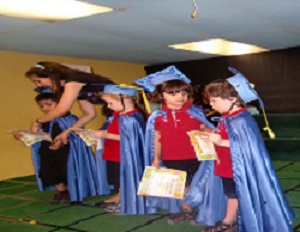Emphasis on educational play
We learn best by doing, and by engaging as many of our senses and strengths as possible. If the activities are fun, learning is easy.
Children also need free play in order to digest information they have been exposed to, practice life skills, and learn to navigate social interactions with peers. If we build a varied and strong foundation, future learning is easier, and we come to perceive ourselves as smart and capable.
Those who perceive themselves as smart and capable have better educational and vocational outcomes than those who do not, despite equal measured intelligence.
Research Based Methodology
We employ research-proven methods to optimize our program. Among these are:
- Low student to teacher ratio (typically 4 to 1)
- Multi-modal instruction,
- Positive reinforcement,
- Use of Zone of Proximal Development
- Themed learning,
- Multi-sensory learning activities,
- Integration and linking,
- Modeling and repetition,
- Memory strategies,
- Environmental and incidental learning,
- Individualized age/skill-level appropriate worksheets,
- Goal setting and completion
Multi-modal Instruction:
Young children learn best through a variety of activities that capitalize on their individual strengths and learning styles. Methods and activities we employ include:
Circle Time, singing, dancing, performance, reenactments, celebrations, small group instruction, arts and crafts, age appropriate worksheets, table work, walking field trips, science experiments, story time, free play (indoor and outdoor), imaginative play, water play (summers), repetition games, puzzle completion, educational computer games, and more.
Outcomes
We understand that each child has their own strengths, weaknesses, and preferences.
Through our research proven methods and by providing one on one attention, our kids typically gain the ability to:
- Read through phonetically decoding (English)
- Write simple words (English)
- Demonstrate understanding of basic math concepts (such as more, less, bigger, smaller, equal, shapes, parallel lines.)
- Count and write numbers, some even to 100 or more
- Add 1 digit numbers,
- Understand the concept of subtraction (some can also subtract 1 digit numbers)
- Tell time to the hour (or better)
- Sing along and perform choreographed dance moves to several songs at our annual end of the summer school show.
- Farsi learning students will learn the Farsi alphabet (some also learn to read and write in Farsi)
- Demonstrate understanding of basic scientific concepts
- Demonstrate knowledge of figures and events in American History
- Demonstrate knowledge of Persian New Year, Mehregan, Yalda night, and other important cultural events and US holidays
- Demonstrate school readiness skills such as following direction, expressing needs, completing and turning in work, classroom decorum, basic conflict resolution skills, and appropriate compliance with teacher requests and school rules.
End of Summer Show
One of the ways that our kids demonstrate their growth is our annual end of the summer show. We use the show to get the kids to work towards both personal and common goals. The added benefit is that by overcoming personal obstacles and performing in front of their parents, they gain trust in themselves, experience accomplishment, and build confidence.
Through practicing for the show and performing at the show they learn:
- Vocabulary and General Knowledge
- Listening Skills
- Motor Skills
- Collaboration and Cooperation
- Conflict Resolution
- Persistence
- Confidence and Self Reliance
- A Sense of Accomplishment and Pride
- Learning Strategies
- and much more.
This method of learning is so much fun that we have had a number of former students come back and volunteer to teach song and dance numbers as Jr. teachers. We have even had older siblings and guest students contribute to the choreography and get in on the act!
The content and caliber of the show depends completely on the capabilities of the kids in the show.
Our shows are followed by a “promotion ceremony” and celebration where every child is made to feel special in front of their families. And then, the following week, we conduct “wacky days” where the kids get to do every song any way they want with no set choreography or limits on how many can perform each role or position. The idea is to let go on how things “should” be done, inspire creativity, fulfill their heart’s desires, and maximize the fun!
Staff Spotlight
Lily Ashoor– Owner and lead teacher
License number: 197407325
Owner Lily Ashoor was a pediatrician in Iran. She currently has a daycare license and a pre-school principal degree, both obtained in California.
Lily Ashoor practiced as a licensed pediatrician in Tehran, Iran. She received her daycare license and pre-school principal degrees in 1995. She is the lead teacher at Koodakestane Lily and oversees performance and training of other teachers and volunteers.
Sharzad Firooz– Performance Director and Program Consultant
Sharzad Firooz is a former school psychologist for HLPUSD. She has a Bachelor’s degree in Human Development and a minor in music from UC San Diego, as well as a Masters degree in School Psychology from California State University Northridge.





